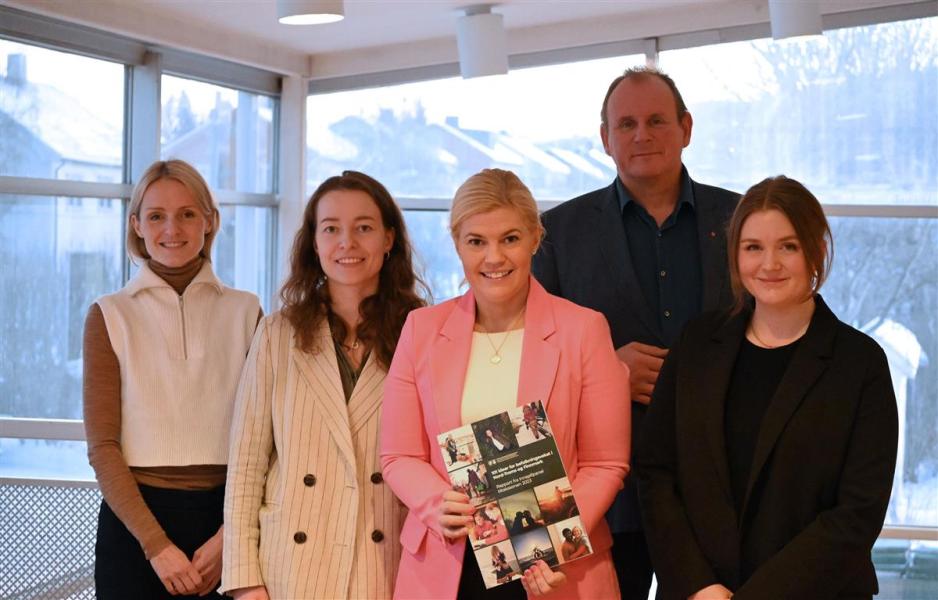Suggests New Measures For Population Growth in the North

A panel appointed by Troms and Finnmark County Council has now delivered its advice for developing measures to make people stay and move to the region. Here are some of the panel participants: Vibeke Tannvik (NHO), Karen Rostrup Martinsen (Øst-Finnmarkrådet), County Council Chairman Kristina Torbergsen, Bjørn Johansen (LO), and Rakel Lund Heggelund (inhabitant, Storslett). (Photo: Hanne Lille/Troms and Finnmark County Council)
Extended arrangements for reducing student loans, increased child benefits, permanent trainee programs, and measures for new housing. These are among the recommendations from an advice panel on the Finnmark and Northern Troms action zone in Northern Norway.
On Tuesday, an advice panel for the Northern Troms and Finnmark action zone in Northern Norway presented its report. In this sparsely populated area, both person and business-oriented incentives are used to stop population decline.
The panel was appointed by the Troms and Finnmark County Council in May and has been led by County Council Chair Kristina Torbergsen (Labor).
The report includes eight specific recommendations for strengthening the action zone – as well as 101 ideas and thoughts for inspiration.
It is intended as input for the Norwegian government's High North policy to turn the negative population development in the North around – and for the work on societal development on a regional level.
From the new year, Troms County and Finnmark County will be restored (after a merge in 2020), and Torbergsen encourages the two county councils to utilize the report in their continued work to make more people stay and move to the region.
The panel consisted of elected officials, inhabitants, representatives from the Norwegian Confederation of Trade Unions, the Confederation of Norwegian Enterprise, the Troms and Finnmark Youth County Council, and the regional councils in the action zone, as well as a sociologist from UiT – the Arctic University of Norway.
"It has been useful and inspiring to invite different voices together. In the time coming, all good forces in the region must be invited into the important work of creating policy and measures that actually work. The best policy for us in the North is created by us in the North," says Torbergsen.
The Panel's Eight Recommendations:
– Equal terms for state measures in the entire action zone.
– Marketing of the zone must be strengthened, and it must be given a new name.
– Expand the reduction of student loans to NOK 50,000 and extend the arrangement to include more occupational groups where the need for labor is large and growing, like nurses.
– Reintroduce increased child benefits. It should be doubled compared to today's figures.
– Regional trainee schemes in Northern Troms and Finnmark are excellent measures to make people move here and must be an integrated part of the action zone. The operation of the schemes must be permanently funded in the state budget.
– Introduce various models and schemes to increase the share of available housing.
– The Regional Development Program (RUP) must be reintroduced in the counties. Funds must be allocated for business development in Nord-Troms and Finnmark, which can be applied for.
– The exemption from the employer tax must be continued – and the employer tax on income over NOK 850 000 must be removed so that there is an actual exemption from the tax in this zone.
For further discussion
Among the 101 ideas and thoughts around improvement of the action zone are flexible educational programs, a Svalbard tax (tax rates are significantly lower there than on the Norwegian mainland), a bonus for each child born, and a sponsorship program for new inhabitants.
See the report in its entirety here (Norwegian only).
The panel also raised the following questions for further debate:
- How can we prevent the lack of labor from creating a competitive situation?
- How can organizations and major employers share experiences and cooperate better on measures?
- Are state financial compensation schemes a headrest leading to employers not taking responsibility and putting their own funds in the pot?



